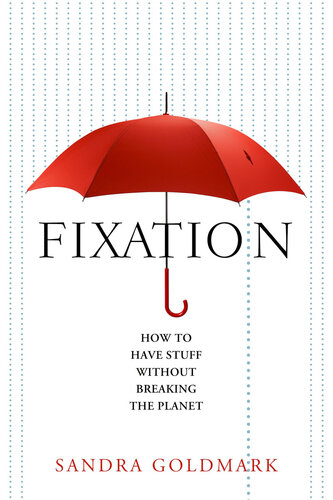
Fixation
How to Have Stuff without Breaking the Planet
- اطلاعات
- نقد و بررسی
- دیدگاه کاربران
نقد و بررسی

August 15, 2020
A professor of professional practice champions social and political change that will reshape our economies into a circular model that protects the planet--and us. This is a carefully researched and closely reasoned critique of consumerism, resource depletion, cheap labor, waste, and the ruinous belief in unbridled growth. In 2013, Goldmark employed her skills as a theatrical set and costume designer to open a series of short-term pop-up repair shops in New York City, discovering more sustainable ways of utilizing the "stuff" we too often discard. The author clearly educated herself on the many complex threads of local, national, and global issues involved in the promotion of rampant consumerism. She demonstrates how our linear manufacturing model inevitably creates monumental waste, not just planned obsolescence, and how durability and ease of repair seldom enter the equation. The real environmental tab is the energy we waste and the human costs of cheap labor. Goldmark places responsibility not just with corporations, but also with the consumer. Paraphrasing Michael Pollan's guidelines on eating, she advocates buying well-made, durable products, not too many, mostly reclaimed, caring for them and, when possible, passing them on. Beyond individual behavior, some of the author's proposed systemic solutions are sound. However, she sometimes clouds her arguments with sermons on the myth of the American West and religion, sounding like a left-leaning urban ideologue who brooks no argument with her interpretation of the facts. Some matters are more complicated than she would have it. Insofar as the big picture is concerned--countering excessive consumerism, transforming capitalism's eternal growth ethic into something more reasonable--one fears that the author is up against a tide that will refuse to wane until it's too late. Nonetheless, at least she's trying, as are others, to educate and inspire change. Many of Goldmark's narrative threads are ripe for further study. A sturdy argument that small choices can lay a foundation for larger collective shifts.
COPYRIGHT(2020) Kirkus Reviews, ALL RIGHTS RESERVED.

December 4, 2020
When Goldmark's beloved lamp, a knockoff of a more expensive version, couldn't be fixed, she began to question the manufacturing processes that make it so hard to fix an item and so easy to throw it away. A crisis of consumerism descended on this theater-set designer. Goldmark was accustomed to cobbling bits and bobs together, to innovating and making do. She and a few friends decided to offer their fix-it abilities to others. In their pop-up shops, they repaired shower radios and stuffed reindeer; they also encountered the unfixable-by-fiat iPad. Goldmark finds a template for her explorations in writer Michael Pollan's approach to food (The Omnivore's Dilemma) which leads her to ask: What is the true cost of our goods to the planet? Plastic is an awful material, usually, but many well-made products are out of reach for most, hence, the use of plastic in manufacturing. And ""stuff"" plagues everyone; Marie Kondo and hoarders are two sides of the same coin. Rather than a how-to book, this is a moral, physical, and metaphysical exploration into material culture, with a little Christian theology thrown into the mix.
COPYRIGHT(2020) Booklist, ALL RIGHTS RESERVED.




دیدگاه کاربران